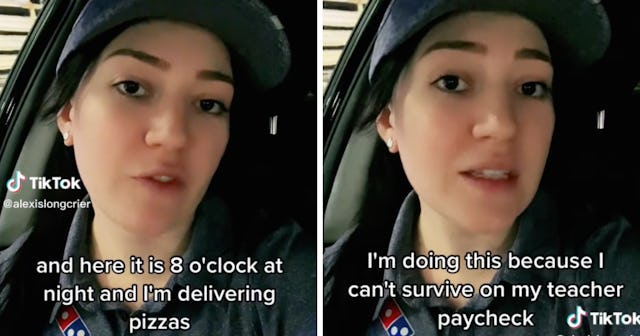Teachers Are Sharing The Second Jobs They Have To Make Ends Meet
It started with a viral video of a teacher who explained why she delivers pizzas at night.

Teaching is a profession that requires years of schooling and training, enormous reserves of energy, and an incredible passion for kids and education. And although teachers spend years getting educated and certified, many find that when they finally achieve their dreams, they are met with salaries that barely cover their living expenses or pay their student loans.
At the same time, many teachers in the United States are working under dire conditions after several outrageously difficult pandemic years. They’ve dealt with remote teaching, school closures, unsafe masking policies, low wages, and increasingly anxious and depressed kids.
The conditions have led to a mass exodus of teachers, in which at least 55% of teachers are looking to leave their careers for greener pastures with better hours and living wages.
Now, one teacher is speaking out about how much she wants to stay, but how difficult it is to swing on her low salary. Teacher Alexis Longcrier shared her experience on TikTok, where she explained that she wants to keep teaching, but has to deliver pizzas at night just to keep going.
“I’m a full-time teacher,” she says, while sitting in her Dominos uniform in her car. “And here it is 8 o’clock at night, and I’m delivering pizzas. I’m doing this because I can’t survive on my teacher paycheck. Everyone’s talking about all the reasons teachers want to leave. But what about all the teacher that want to stay, but literally can’t afford to?”
In just days, the video has garnered over 2.4 million views and over 14,000 comments. Many of the comments are from other educators who moonlight in order to pay rent or bills:
“Teacher w a masters and i have a 2nd job to pay the bills... it shouldn’t have to be this hard,” one shared.
“Teacher here. I also work as customer support for a travel company.”
“I’m a teacher with a masters and I sell my plasma to get by.”
“I have a masters and work extra duties. Work a part-time job, sell my plasma. We need a livable wage.”
“Hi, fellow teacher. I had to start my own mobile welding business on the side for the same reason.”
“I love it, but I’m doing Lyft after work and spreading myself super thin.”
“I work at Target part time for the same reason.”
“I’m a teacher who has fully accepted that I’ll never own a house, have kids, be able to support anyone but myself, live in a nicer area.”
Since posting the video, Longcrier has posted several follow-ups. In one, she explains that she went to Berkley and Northwestern, and had earned two master’s degrees by the time she was 23. She also spent several years in the Marines before settling into teaching. Even with that background, she shared that she only takes home about $2,500 a month after deduction to support her family and two children, an amount that makes it impossible to get by without a second job.
She also had some stern words for people who clapped back in the comments about how teachers gets summers off and short school days.
“Hey man, if my job was so easy, why don’t you come do it,” she asked. “I mean, if everybody in the U.S. wanted this job, there wouldn’t be a teacher shortage, right? Oh wait, there is.”
She also clarified that everyone deserves a living wage, whether they’re a teacher or anyone else.
“If you work a full-time job, you should only work one,” she said. “And you should be able to afford to eat out sometimes, go see a movie, enjoy your life. You were not made to just work, struggle, and die. None of us just deserve a life, we deserve a quality of life, too.”
What does it say about the United States that we claim to care so much about education and our children’s futures, when we don’t pay educators enough to even focus fully on their jobs as teachers? And how can we be surprised that there’s a teacher shortage when the system makes it nearly impossible for teachers to live happy and healthy lives?
Public education isn’t going to improve until our educators are treated right.
This article was originally published on